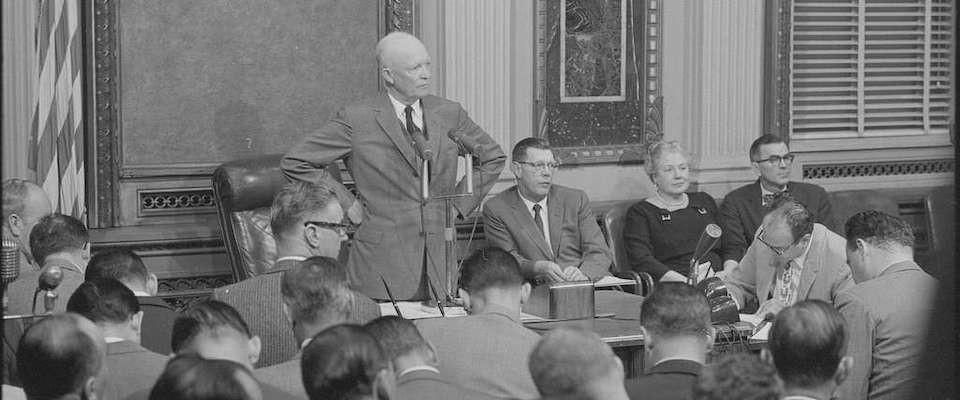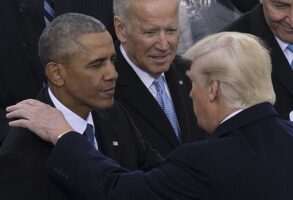
Published May 17, 2023
hree days before Christmas 1952 and a month before his inauguration as the thirty-fourth president of the United States, Dwight D. Eisenhower addressed the Freedoms Foundation at the Waldorf Astoria in New York. There, the president-elect declared that “our form of government [makes] no sense unless it is founded in a deeply felt religious faith, and I don’t care what it is.” Ike, no theologian, was subsequently mocked for his seeming indifference to the nuances of religious belief and their impact on public life; his comment confirmed to his cultured despisers their stereotypical (and quite false) view of him as a smiling dunce. In fact, Eisenhower was speaking an important truth, however inelegant his formulation.
Authentic religious faith reminds us that this world is not all there is—that the world as we perceive it is englobed in a larger, transcendent reality that gives meaning to the here and now. Authentic religious faith reminds us that human beings are matter and spirit and that, without the latter, our material selves are just an accidental conjunction of cosmic biochemical forces. Authentic religious faith reminds us that our obligations extend beyond “me.”
What does any of this have to do, though, with “our form of government”? A great deal, I suggest.
As even a cursory historical survey confirms, self-governance is not the norm in human affairs. One or another form of authoritarianism is. Nor is there anything given about a democracy’s success or longevity after it’s been constitutionally established.
The prime cautionary tale here is Germany’s Weimar Republic, set up after the collapse of the German Empire—the “Second Reich”—after Germany’s defeat in World War I and the German kaiser’s exile to Holland. The constitution of the Weimar Republic (so called because the national capital was moved from Prussian Berlin to the Thuringian city of Weimar) was designed by some of the finest minds of the time, including the great sociologist Max Weber. The designers got the mechanisms of democracy right: separation of powers, regular elections, an independent judiciary, etc. But when the Great Depression brought unbearable pressures to bear on that nascent democracy (including an inflation so severe that people bought bread with banknotes carried in wheelbarrows), the Weimar Republic crumbled. Then Adolf Hitler’s “Third Reich” came to power in an election that wrote the obituary for interwar Germany’s brief experiment in democratic self-governance—and much else.
The crucial lesson to be drawn from that debacle is that “democracy” is not a matter of institutions and procedures alone. It takes a critical mass of citizens, living by certain virtues and the convictions that undergird them, to make a democracy work so that the result is individual human flourishing and social solidarity. Respect for the dignity of every human person; openness to the possibility that others may be right about a contested policy; a firm commitment to the rule of law rather than the rule of brute force; the acceptance of electoral defeat or incremental legislative success—these democratic necessities don’t just happen. They’re the by-products of prior convictions and moral commitments that, for Americans, have typically been born from what Dwight D. Eisenhower called “a deeply felt religious faith”—or its analogues in the nation’s public philosophy.
If I may be permitted a brief lurch into philosophy’s technical vocabulary: Our politics today suffer from a want of metaphysics. And from that deficit has come a dangerously distorted anthropology. Which means: If a culture denies what classic Western metaphysics (and biblical religion) taught for millennia—that there are immutable truths built into the world and into us—then false and even bizarre notions of what a human being is inevitably follow. So do equally false and bizarre ideas of what makes for human flourishing and social solidarity. Public life then becomes not an ongoing, rational conversation about how we should live together, but a power struggle in which those false and bizarre ideas of who we are and how we flourish try to impose themselves on society. And the pushback against such imposition gets ugly.
If all that has a familiar ring to it, it’s because it describes the situation in which the Western world too often finds itself today. That is why it is serious bad news if religious communities embrace the distortions of the human condition taught by gender theory, critical racial theory, and other ideologies of power that deny the truths built into the world and into us. As C. S. Lewis observed, our spiritual natures demand nourishment. Denied healthy food, they will ingest poison, to the detriment of both authentic religion and democratic public life.
George Weigel is Distinguished Senior Fellow of Washington, D.C.’s Ethics and Public Policy Center, where he holds the William E. Simon Chair in Catholic Studies.
George Weigel, Distinguished Senior Fellow of the Ethics and Public Policy Center, is a Catholic theologian and one of America’s leading public intellectuals. He holds EPPC’s William E. Simon Chair in Catholic Studies.








